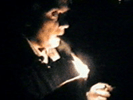 Playing “In the Company of Men”, 2003 (Arnaud Desplechin). Arnaud Desplechin’s fractured, self-reflexive portrait of corporate anomie, based on British author Edward Bond’s play In the Company of Men, is a frustratingly disjointed and excessively soundtracked (often with unnecessarily cranked up, thematically unrelated music from Paul Weller and The Jam that renders the dialogue inaudible) that is punctuated with episodes of fractured clarity. Fusing elements of Shakesperean tragedy and contemporary social realism, artistic performance and real life, as episodes of acting rehearsals and war news footage are intercut into the storyline, the film centers on the difficult, often troubled personal and professional relationships of a rootless, privileged businessman, Léonard (Sami Bouajila), the adopted heir of an arms manufacturer named Henri Jurrieu (Jean-Paul Roussillon), who, impatient with his stalled ascendancy within his ailing father’s company, forges a series of disreputable alliances, first, in an attempt to acquire sufficient shareholder stake for board membership, and subsequently, to prevent his father from uncovering the truth behind his duplicity. However, apart of the guerrilla-like tactics of corporate machinations (a subplot that similarly plagues, and ultimately derails, Olivier Assayas’ maddeningly unfocused film, demonlover), the most indelible moments in the film result from the seeming synthesis of nightmarish delusion and haunted memory: an image the proves to be the most visceral and elemental in deconstructing the psychological puzzle of an inscrutable, modern day tragic hero.
Playing “In the Company of Men”, 2003 (Arnaud Desplechin). Arnaud Desplechin’s fractured, self-reflexive portrait of corporate anomie, based on British author Edward Bond’s play In the Company of Men, is a frustratingly disjointed and excessively soundtracked (often with unnecessarily cranked up, thematically unrelated music from Paul Weller and The Jam that renders the dialogue inaudible) that is punctuated with episodes of fractured clarity. Fusing elements of Shakesperean tragedy and contemporary social realism, artistic performance and real life, as episodes of acting rehearsals and war news footage are intercut into the storyline, the film centers on the difficult, often troubled personal and professional relationships of a rootless, privileged businessman, Léonard (Sami Bouajila), the adopted heir of an arms manufacturer named Henri Jurrieu (Jean-Paul Roussillon), who, impatient with his stalled ascendancy within his ailing father’s company, forges a series of disreputable alliances, first, in an attempt to acquire sufficient shareholder stake for board membership, and subsequently, to prevent his father from uncovering the truth behind his duplicity. However, apart of the guerrilla-like tactics of corporate machinations (a subplot that similarly plagues, and ultimately derails, Olivier Assayas’ maddeningly unfocused film, demonlover), the most indelible moments in the film result from the seeming synthesis of nightmarish delusion and haunted memory: an image the proves to be the most visceral and elemental in deconstructing the psychological puzzle of an inscrutable, modern day tragic hero.
 Gambling, Gods and LSD, 2002 (Peter Mettler). Peter Mettler’s rigorous and organic meditative essay is (perhaps intentionally) a mind numbing ethnographic collage of people, places, ideas, and discoveries that collective encompass humanity’s innate desire for escapism, commutation, euphoria, and existential transcendence. Originating locally from Mettler’s sad and implicitly tragic reunion with a childhood friend who has led most of his inutile adult life in the fog of substance abuse, the filmmaker visually links his roots (in the childhood memory of an idyllic river) with images of migration (in the milieu of the Toronto International Airport) to create an eclectic (and inherently uneven) assembly of personal experience: what Mettler describes as the state of people – at times, rapturous (as members of a religious congregation exhibit episodes of spasmodic spiritual ecstasy), decadent (as people indulge in gambling, strip clubs, and sexual paraphernalia), thrill-seeking (a newly married couple punctuate their wedding vows with a bungee jump), inexplicable (a crowd gathers for the controlled implosion of a disused casino), melancholic (a man recalls his late wife’s death from cancer as he displays her remains contained in a headscarf that she had worn while in chemotherapy), tragic (a mass murder on a Native American reservation), and bewildering (a small village in rural India reacts to the curious spectacle of a camera crew) – but all idiosyncratically, fundamentally, and infallibly human.
Gambling, Gods and LSD, 2002 (Peter Mettler). Peter Mettler’s rigorous and organic meditative essay is (perhaps intentionally) a mind numbing ethnographic collage of people, places, ideas, and discoveries that collective encompass humanity’s innate desire for escapism, commutation, euphoria, and existential transcendence. Originating locally from Mettler’s sad and implicitly tragic reunion with a childhood friend who has led most of his inutile adult life in the fog of substance abuse, the filmmaker visually links his roots (in the childhood memory of an idyllic river) with images of migration (in the milieu of the Toronto International Airport) to create an eclectic (and inherently uneven) assembly of personal experience: what Mettler describes as the state of people – at times, rapturous (as members of a religious congregation exhibit episodes of spasmodic spiritual ecstasy), decadent (as people indulge in gambling, strip clubs, and sexual paraphernalia), thrill-seeking (a newly married couple punctuate their wedding vows with a bungee jump), inexplicable (a crowd gathers for the controlled implosion of a disused casino), melancholic (a man recalls his late wife’s death from cancer as he displays her remains contained in a headscarf that she had worn while in chemotherapy), tragic (a mass murder on a Native American reservation), and bewildering (a small village in rural India reacts to the curious spectacle of a camera crew) – but all idiosyncratically, fundamentally, and infallibly human.
Shanghai Panic, 2001 (Andrew Cheng). Based on a banned novel by underground writer Mian Mian entitled Welcome to Panic, Andrew Cheng’s socially relevant, but technically uneven digital video pseudo-documentary follows a close-knit group of rootless, young adults (apparently played by Mian Mian and her circle of friends) in the urban jungle of Shanghai as a male friend – perhaps struggling to come to terms with the implications of his homosexuality – becomes convinced that he has contracted AIDS. Broaching issues of privacy, confidentiality, escapism, and anonymity in a largely impersonal, yet tightly controlled and repressive country, Shanghai Panic is a brave and admirable attempt to capture the reality of contemporary Shanghai that, to its detriment, is mired by the filmmaker’s inexperience and meandering focus and becomes diluted in its caustic potency.
Welcome to Destination China, 2003 (Andrew Cheng). Creating another slice-of-life pseudo-documentary chronicle of marginalized people living in impoverished slums along the banks of the Suzhou River (and in the process, deconstructs the romantic vision of Ye Lou’s ephemeral Suzhou River), Welcome to Destination China loosely centers on a madam called Jennifer and the desperate people whose meager livelihood rests on her disreputable enterprise: a handsome young man unable to find a decent job, a pragmatic prostitute searching for ways to maximize her income, a naïve young woman from the province determined to earn enough money in order to bring her parents into Shanghai. Perhaps the most compelling story is that of Jennifer’s long-time friend, Ah-ling, an aging actress sent down from Shanghai during the Cultural Revolution and whose only means of returning to the city was a marriage of convenience to a gay man (who, unfortunately, was played with ridiculous, exaggerated theatricality by an actor who seems to have learned his craft by training as a circus mime). Creating a paradoxical, irreconcilable vision of Shanghai – one, a destination of privilege and a globalized, urban megalopolis of unlimited possibility, and the other, an inescapable abyss of poverty, want, alienation, and violence – Sixth Generation filmmaker, Andrew Cheng, creates a flawed and unfocused, but incisive dystopic vision of contemporary Shanghai.
No Rest for the Brave, 2003 (Alain Guiraudie). Recalling the surreal, playfully nonsensical logic puzzles of Raoul Ruiz (although lacking the Chilean-born filmmaker’s elegantly fluid camerawork and clever storytelling agility), No Rest for the Brave is an absurdist, occasionally humorous, but ultimately pointless and incoherent excursion into the ambiguous, forbidding, and untenable terrain of dream state and the subconscious as a young man, having experienced a troublingly lucid dream that his next sleep would become his last, attempts to outrun his personal demons that seemingly take on the form of a persistent nemesis named Johnny Got. Unfortunately, unable to reconcile the wildly diverging, fast and loose narrative threads of the film, Guiraudie resorts to the tidy, conventional – and reprehensibly unimaginative – tactic of having the young hero articulate his learned life lessons in an unearned, neat summation direct address monologue that concludes the film.
 The Story of Marie and Julien, 2003 (Jacques Rivette). Jacques Rivette creates another refined and sublimely enrapturing composition in The Story of Marie and Julien, a film that ostensibly chronicles the relationship between a brooding, reclusive restorer of antique clocks and occasional blackmailer named Julien (Jerzy Radziwilowicz) and the elusive object of his affection, a beautiful and enigmatic woman named Marie (Emmanuelle Béart) whom he had once known at a time when both were emotionally unavailable. As the film opens, a pensive Julien sits on a park bench and begins to experience an unsettling, prescient dream involving his passing acquaintance, Marie, and in the process, betrays a sense of regret and missed opportunity at their seemingly star-crossed romantic fate. Now, a year later, his haunted, unrequited melancholy now seems entirely reconcilable when he runs into a hurried Marie once again while she rushes to catch a bus at a busy intersection and he, to an appointment with the subject of his blackmail: a woman called Madame X (Anne Brochet) who had perhaps murdered her sister. Illustrating familiar Rivette imagery of interweaving parallel realities, manifestation of the subconscious, and elliptical mystery, the film evolves into a gorgeously hypnotic, slow simmering, and smoldering tone piece on chance, connection, and destiny.
The Story of Marie and Julien, 2003 (Jacques Rivette). Jacques Rivette creates another refined and sublimely enrapturing composition in The Story of Marie and Julien, a film that ostensibly chronicles the relationship between a brooding, reclusive restorer of antique clocks and occasional blackmailer named Julien (Jerzy Radziwilowicz) and the elusive object of his affection, a beautiful and enigmatic woman named Marie (Emmanuelle Béart) whom he had once known at a time when both were emotionally unavailable. As the film opens, a pensive Julien sits on a park bench and begins to experience an unsettling, prescient dream involving his passing acquaintance, Marie, and in the process, betrays a sense of regret and missed opportunity at their seemingly star-crossed romantic fate. Now, a year later, his haunted, unrequited melancholy now seems entirely reconcilable when he runs into a hurried Marie once again while she rushes to catch a bus at a busy intersection and he, to an appointment with the subject of his blackmail: a woman called Madame X (Anne Brochet) who had perhaps murdered her sister. Illustrating familiar Rivette imagery of interweaving parallel realities, manifestation of the subconscious, and elliptical mystery, the film evolves into a gorgeously hypnotic, slow simmering, and smoldering tone piece on chance, connection, and destiny.
The Magic Gloves, 2003 (Martín Rejtman). From a seemingly innocuous encounter between a gregarious musician who goes by the stage name Piranha and an impassive and unambitious cab driver, Alejandro, whom he recognizes (perhaps mistakenly) as his brother’s childhood friend, Martín Rejtman creates an effervescent comedy of errors as the well-intentioned Piranha and his equally enthusiastic wife attempt to reunite Alejandro with his recently estranged ex-girlfriend, leading to an ever complicating and unraveling web of romantic entanglements and concocted schemes in the pursuit of holistic well-being and self-improvement that culminates in a seemingly fool-proof venture to market one-size-fits-all magic gloves. Unfolding with the droll, gentle humor of Aki Kaurismäki’s tragicomic fables fused with the situational absurdity of a subdued Pedro Almodóvar, The Magic Gloves is a lighthearted, gentle, and unassuming human comedy on the mundane rituals of everyday life.
 Los Angeles Plays Itself, 2003 (Thom Andersen). Ostensibly named after a notorious gay porn film entitled L.A. Plays Itself (where the systematic degradation of the city was paralleled through increasingly violent sexual encounters), Los Angeles Plays Itself is a thoughtful and sublimely articulate stream of consciousness piece that explores Hollywood’s historical neutering, mythification, and suppression of Los Angeles’ native cultural identity in its attempts to transform and assimilate the city as a convenient, large-scale studio set for the motion picture industry. Written by Los Angeles native and affirmed cineaste Andersen and narrated by Encke King, the film demystifies the popular misconception and fallacy of the city’s economic dependence on the movie industry – a trivialization the he associates with the city’s referential abbreviation to L.A. within the context of Hollywood insider truncation – through historically de-contextualized (and often, implicitly sinister) architecture and landmarks, depictions of racial and cultural homogeneity, and the perceptional distortion of his beloved native town as an epicenter for moral corruption (in such noir-toned films as Billy Wilder’s Sunset Boulevard, Roman Polanski’s Chinatown, and Curtis Hanson’s L.A. Confidential), desolation (in post-apocalyptic films like John Carpenter’s Escape from New York and Ridley Scott’s Bladerunner), and decadent excess (William Friedkin’s To Live and Die in L.A. and Mick Jackson’s L.A. Story). Drawing provocative social implications in the bureaucratic decision to curtail development of the public mass transportation system in favor of automobile ownership and the construction of freeways, Andersen traces the development of an indigenous – and consequently, more representationally Los Angeles – cinema presented by groundbreaking early independent features, like Kent Mackenzie’s The Exiles on the plight and subculture of Mexican-Americans and Charles Burnett’s seminal, semi-autobiographical film Killer of Sheep on a working class African-American family, to create a perceptive, passionate, and unabashedly humanist meditation on social and cultural identity, privilege, race, and inclusion.
Los Angeles Plays Itself, 2003 (Thom Andersen). Ostensibly named after a notorious gay porn film entitled L.A. Plays Itself (where the systematic degradation of the city was paralleled through increasingly violent sexual encounters), Los Angeles Plays Itself is a thoughtful and sublimely articulate stream of consciousness piece that explores Hollywood’s historical neutering, mythification, and suppression of Los Angeles’ native cultural identity in its attempts to transform and assimilate the city as a convenient, large-scale studio set for the motion picture industry. Written by Los Angeles native and affirmed cineaste Andersen and narrated by Encke King, the film demystifies the popular misconception and fallacy of the city’s economic dependence on the movie industry – a trivialization the he associates with the city’s referential abbreviation to L.A. within the context of Hollywood insider truncation – through historically de-contextualized (and often, implicitly sinister) architecture and landmarks, depictions of racial and cultural homogeneity, and the perceptional distortion of his beloved native town as an epicenter for moral corruption (in such noir-toned films as Billy Wilder’s Sunset Boulevard, Roman Polanski’s Chinatown, and Curtis Hanson’s L.A. Confidential), desolation (in post-apocalyptic films like John Carpenter’s Escape from New York and Ridley Scott’s Bladerunner), and decadent excess (William Friedkin’s To Live and Die in L.A. and Mick Jackson’s L.A. Story). Drawing provocative social implications in the bureaucratic decision to curtail development of the public mass transportation system in favor of automobile ownership and the construction of freeways, Andersen traces the development of an indigenous – and consequently, more representationally Los Angeles – cinema presented by groundbreaking early independent features, like Kent Mackenzie’s The Exiles on the plight and subculture of Mexican-Americans and Charles Burnett’s seminal, semi-autobiographical film Killer of Sheep on a working class African-American family, to create a perceptive, passionate, and unabashedly humanist meditation on social and cultural identity, privilege, race, and inclusion.
The World’s Greatest Sinner, 1962 (Timothy Carey). Iconic character actor and inimitable personality Timothy Carey’s eccentrically flawed, indescribably lowbrow, and madly egocentric, yet indelible satire, The World’s Greatest Sinner, is a commendable exposition on opportunism, moral bankruptcy, and idolatry as a bored insurance salesman, Clarence Hilliard, re-invents himself as a youth attuned, hip-gyrating pop star in order to gain public exposure and build a constituency base for his political ministry. Renaming himself “God”, Hilliard’s decision to run as a presidential candidate under the unsubstantive, but universally appealing platform of personal empowerment and eternal life – and in the process, attract an ever-widening circle of fanatical followers – serves as a patently bizarre, deliriously kitschy, and idiosyncratically disjointed portrait on spiritual desolation, existential vacuity, and monomania as the once seemingly grounded Hilliard becomes estranged from his family and faith under the intoxicating, corrupting delusion of power.
Acquarello, 2003 [reprinted]